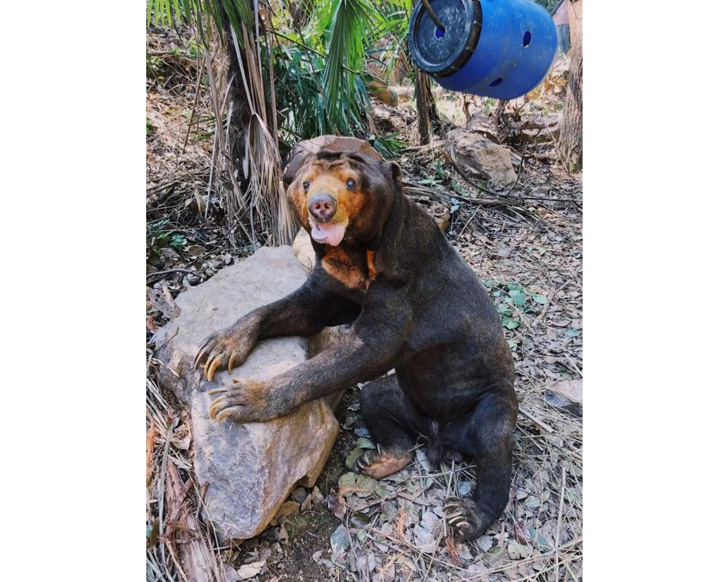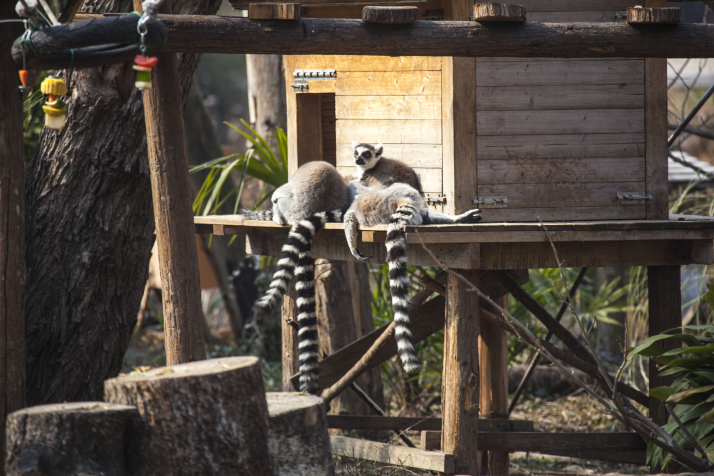| China |
| Obituary for a bear | |
|
|
 Sun bear Lao Ma (NANJING HONGSHAN FOREST ZOO)
A handwritten obituary was pasted on the outer wall of the Bear Valley exhibit at Nanjing Hongshan Forest Zoo in Jiangsu Province on January 1, one day after a sun bear named Lao Ma passed away. It was written by the staff of the Bear Valley, with over 400 Chinese characters in six paragraphs outlining the bear's life and contributions to the zoo, and memorializing beautiful moments that he'd had at the zoo. "Lao Ma passed away peacefully in his sleep on the last day of 2022, at the age of 33," the obituary read. "We are lucky to have met Lao Ma and to spend time with him during our lives." Rest in peace Originally from a circus, Lao Ma was moved to the zoo in 1993 at the age of 4 and had lived there ever since. The general life expectancy of sun bears is around 20 years but Lao Ma far outlived that, reaching the age of 33, which is said to equal 100 in human years. The bear's passing took staff by surprise. They said that although he had begun eating less and sleeping more in his final days, they believed he would continue living a little longer as his general condition was good. Guo Chenxu, a keeper at the bear pavilion got the news of Lao Ma's death at noon on December 31. He was on vacation but returned to the zoo immediately. "We knew he would leave soon, but didn't expect it to be so soon," Guo said. Guo introduced that in order to help Lao Ma survive the winter, keepers made a warm straw nest with bales of hay and two electric heaters. As Lao Ma had only one tooth left and was unable to chew, staff made warm vegetable mash and fed him with a special feeder. They also smeared honey in places close to Lao Ma, so that he could enjoy his favorite food any time he wanted. Spending most of his life at the zoo, Lao Ma got married there and witnessed the development of the zoo over the past three decades. Visiting Lao Ma at the zoo has also made childhood memories for many in Nanjing. Lao Ma spent most of his time in his enclosure and, two or three times a week, was taken to an outer field for basking in the sunshine and roaming around a larger area. In 2019, when his wife passed away, Lao Ma was relocated temporarily to a zoo in Yangzhou, another city in Jiangsu Province, due to renovations at the Bear Valley. In early 2021, after the renovation was completed, he moved back to Nanjing. At that point, he was not in good health, spending most of his time alone in his enclosure. In the process of his recovery, the bear became a bigger star as it was cast in a documentary depicting animals' lives at Hongshan Forest Zoo. Lao Ma's story was the first episode and has been viewed over 20 million times on the online video platform of technology giant Tencent since it first aired in 2021. One day in March 2021, he finally recovered enough to make it to the outer field. The staff described that day in the obituary. "It was a nice sunny spring day. Lao Ma sat beside rapeseed flowers, looking up at the flying butterflies as the warm breeze reached him from the city." Shen Zhijun, Director of the zoo, got a close-up of Lao Ma while live-streaming on China's short video platform Douyin in 2021. "I heard its breath, saw its winkles and slow steps," he said. "The keepers sat on a rock and Lao Ma lay on another one. It was like a picture of grandfather and grandchild together." However, the keepers' care didn't stop the bear's natural aging process. His deteriorating eyesight made the move outdoors a risky adventure, so the staff began following him when he wandered outside. "Lao Ma's condition made me think about what getting old means and how we should deal with that," Peng Peila, a zookeeper, said in the documentary. Shen would also picture himself aging. "Will we accept our aging process in the same, calm way?"  Ring-tailed lemurs bask in the sun at Nanjing Hongshan Forest Zoo on February 4 (VCG)
A zoo's mission This is also the question Shen wants zoo visitors to contemplate when looking at senior animals. "Animals in the zoo are not circus performers to entertain people," Shen said. "They also get sick, get old and die." Shen has been working as the director of the zoo since 2008. At that point, many zoos in China were still in a primitive stage of caging animals on concrete floors. Hongshan Forest Zoo was no different. The wolves, as Shen recalled, were locked in hexagonal cages and no longer looked like predators. In 2012, Shen canceled all animal shows at the zoo, making it the first zoo in China to do so. It was a bold decision as 80 percent of the zoo's income came from ticket sales and animal shows were a major draw for people to buy tickets. However, the decrease of visitor flow didn't stop him moving on. He redesigned quite a few exhibits, creating more spacious enclosures and natural surroundings that allow the animals to retain their wild nature. Leopards, for example, are actually timid cats by nature. Their enclosure in the zoo thus has many places for them to hide. In many cases, visitors can only spot the leopards' eyes peering out from the bushes. The new wolf enclosure, opened in 2020, also offers more privacy to the wolves. It is on the slopes of a hill in the zoo and visitors can only see parts of the enclosure from different viewing platforms. Rocks, groves, waterfalls and pools have created a diverse and complex environment. Many visitors have complained that they don't get to see many of the animals at the zoo. "Maybe, some visitors need some time to reconsider the mission of a zoo," Shen said. "A zoo should be a place that guides people to learn more about the nature of animals and respect that." In the 2020 bestseller Going to the Zoo Is a Serious Matter, the writer Chen Min, after visiting 56 zoos in 41 cities across China, rated Hongshan Forest Zoo as one of the best public zoos in China. Many young zoo aficionados have hailed the zoo as one of the landmarks in Nanjing. Shen is glad to see a growing number of young visitors. He hopes the place will be a haven for animals that have lost their habitats. "It is animals, rather than human beings, that should be the hosts of zoos," he said. Copyedited by G.P. Wilson Comments to yuanyuan@cicgamericas.com |
|
||||||||||||||||||||||||||||
|